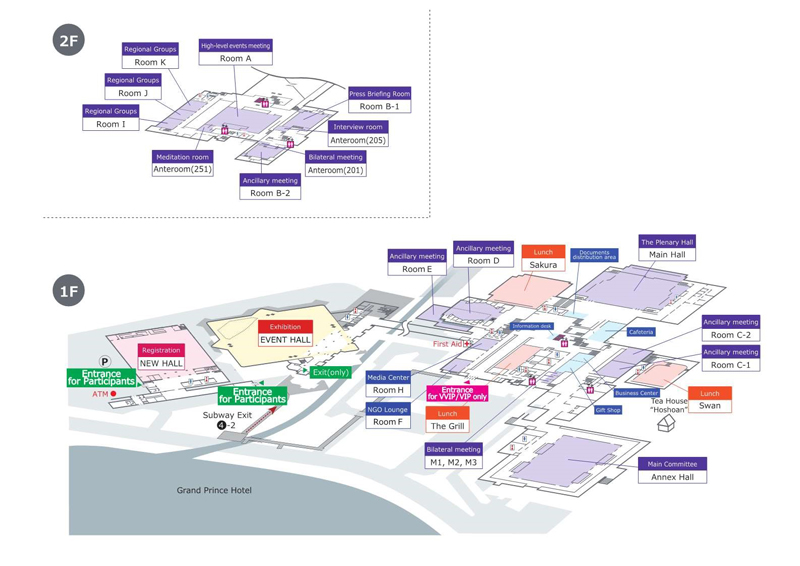- Home>
- Participants Info>
- Useful Information
Useful Information
About Kyoto, Japan
Time
The entire country of Japan is in the same time zone, 9 hours ahead of Greenwich Mean Time (GMT +9). Japan does not adopt the practice of Daylight Saving Time.
Climate and Clothing
The average temperature in Kyoto in March is 8.4C. Spring has mild temperatures, with spring rains common. A light coat or sweater, something you can shed in the warm afternoons, should be adequate. Many restaurants and traditional Japanese religious sites such as Buddhist temples and Shinto shrines request that you leave your shoes at the door. We encourage you to carry or wear socks to avoid walking barefoot. You also may find yourself sitting on the floor, so dress comfortably for that.
Electricity
The voltage used throughout Japan is uniformly 100 volts AC. In Kyoto and western Japan, the frequency of electric current is 60HZ. This is different from most of the world and means that you will need a transformer, power converter, or similar device for sensitive equipment like computers if you are coming from Europe. Japan does not use three-pronged plugs, so it may be necessary for you to get an adapter to use Japan's two-pronged outlets.
Water
Japan’s tap water is drinkable. You can safely drink water inside, outside, in parks and from taps in public stations. Bottled water is available for purchase at vending machines and convenience stores.
Currency
The currency in Japan is yen (JPY,¥). Banknotes and coins are easily identifiable. There are 1, 5, 10, 50, 100 and 500 yen coins, and 1,000, 2,000, 5,000 and 10,000 yen banknotes. Cash can be exchanged at any “Authorized Foreign Exchange Bank” (signs are displayed in English) or at some of Kyoto's large hotels and department stores. Rates vary little between banks, if at all (even the exchange counters at the airport offer rates comparable to those offered by downtown banks). In Kyoto, most major banks are located near the Shijo-Karasuma intersection, two stops north of Kyoto Station on the Karasuma subway line.
Hotels, department stores, high-end restaurants and shops accept credit cards, while some smaller shops do not. You can withdraw money using your credit card at ATM machines located at post offices, convenience stores and at select banks.
Tipping
There is basically no tipping in Japan. Service charges are already included in the bill at hotels, restaurants, taxis, etc.
Tax
A 10% consumption tax is included in all purchases except for products subject to a reduced tax rate. Items subject to the reduced tax are:
- Food and drinks, excluding alcoholic drinks, and dining out;
- Newspapers issued more than twice a week (those based on subscriptions).
Internet Access
Free Wi-Fi spots can be found at many hotels, convenience stores and public areas like shopping malls and train stations. Coverage is sparse in the countryside and mountainous regions. In Kyoto, there are many wireless LAN spots (“KYOTO Wi-Fi”) in which everyone can use the Internet free of charge at bus stops, subway stations, convenience stores, and public facilities.
Mobile Phones
Global roaming – You can use your mobile phone (smartphones only) in Japan. Ensure global roaming has been activated with your service provider before you leave home and the phone is unlocked from the network. Renting or purchasing a SIM card – SIM cards for smartphones allow travelers to use their own mobile phones in Japan, provided the phones are unlocked and work on a Japanese network. Most SIM cards available to foreign tourists are data-only and do not allow for voice calls (except when using internet-based telephone services such as Skype). Many companies have kiosks at the airports, while other companies will mail a phone to your hotel. Renting a Wi-Fi router – Wi-Fi router rentals, sometimes called “Pocket Wi-Fi” – usually offer unlimited data for a daily flat rental fee. Multiple devices can connect to the same hot-spot, so one device can be shared between a group.
Access to Kyoto
The closest international airport to Kyoto city is Kansai International Airport (KIX). However, those who enter Japan by flying into Narita International Airport (NRT), Tokyo International Airport (HND) or other international airports in Japan, may find it most convenient to fly to Osaka International Airport.
Smoking
Smoking is prohibited outside of designated areas in the city. Please smoke only in designated smoking areas.
Telephone services and useful telephone numbers
The country code for Japan is +81.
Police, Criminal Emergencies, Traffic Accidents: 110
Non-criminal (medical or fire) emergencies: 119
University Hospital, Kyoto Prefectural University of Medicine: 075-251-5255
Japanese Red Cross Society, Kyoto Daini Hospital: 075-231-5171
Insurance
The Government of Japan is not responsible for any injury, sickness, hospitalization, or treatment costs, etc. during the stay in Japan. Please make your own arrangements for health insurance, traveler’s insurance and any other necessary insurance.
About KICC
Floor Map PDF

KICC Restaurants during the Kyoto Congress
Information on cafes and restaurants for the Kyoto Congress.
We will open at "The Grill", "NIWA café" and "Sakura" in the Kyoto International Conference Center.
For details, please click here.